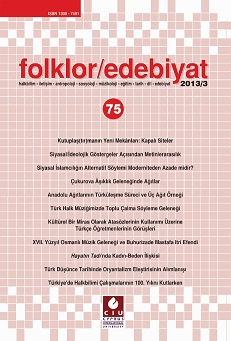XVII. Yüzyil Osmanli Müzik Geleneği Ve Buhurizade Mustafa Itri Efendi
Ottoman Musical Tradition During the XVII Century and Buhurizade Mustafa Itri Efendi
Author(s): Cenk Güray, Murat Salim TokaçSubject(s): Cultural history, Music, Ethnohistory, 18th Century, The Ottoman Empire
Published by: Uluslararası Kıbrıs Üniversitesi
Keywords: Itri; XVII century Ottoman music; makam; theory of cycles; composition analysis;
Summary/Abstract: Buhurizade Mustafa Itri Efendi, is one of the most interesting musical personalities of XVII century Ottoman musical scene, which can be identified as the last era to be culturally connected to the roots of the Ottoman Musical Tradition. Itri received significance as a “master”, by both being “well known” as the composer of important religious music examples of the Islamic World like “Segah Tekbir and Salat-ı Ümmiye”, and being named as a “great composer” due to his musical power that had affected the following generations. But, the details of the “process”-that should b related to the above characters of Itri- by which he had been dignified with the attribute “great” is not yet clear. The research about these details will be only possible with a comparative survey of the practical-theoretical musical works of the period with other sources of art produced in the same era. The first step of such a research should be based on the clues about the life story of Itri which could strongly identify the social relations underlying the musical productions of the period. This step also should require a survey on musical productions of these centuries supported by parallel researches on areas like history, literature as well. The second step should be consisted of a comparative survey of the theoretical and practical musical sources. The works named as ‘theoretical’ are hand written books called “edvar (cycles)”, whereas the practical works are the compositions attributed to Itri which are written in the musical notations of different periods. Such a comparative survey within the light of the social history will be able to produce the seeds of a study indicating the technical effects of Itri and his “school” to the Ottoman musical tradition. The aim of the current study is to build the initial blocks for such an extensive study, by an analytic survey about the music of the XVII-XVIII centuries by putting the name of Itri in the scope. Such studies will not only help in identifying the musical choices accompanying the period so called the “summit” of the Ottoman musical tradition, but also will possibly to assist to expose the “social causes” affecting these choices.
Journal: Folklor/Edebiyat
- Issue Year: 19/2013
- Issue No: 75
- Page Range: 193-210
- Page Count: 18
- Language: Turkish

